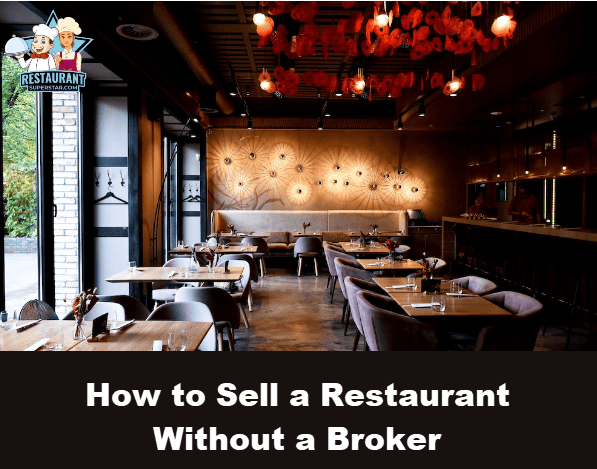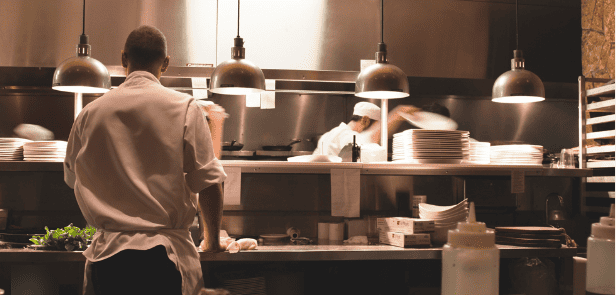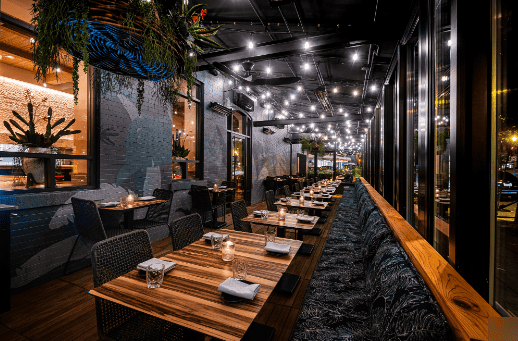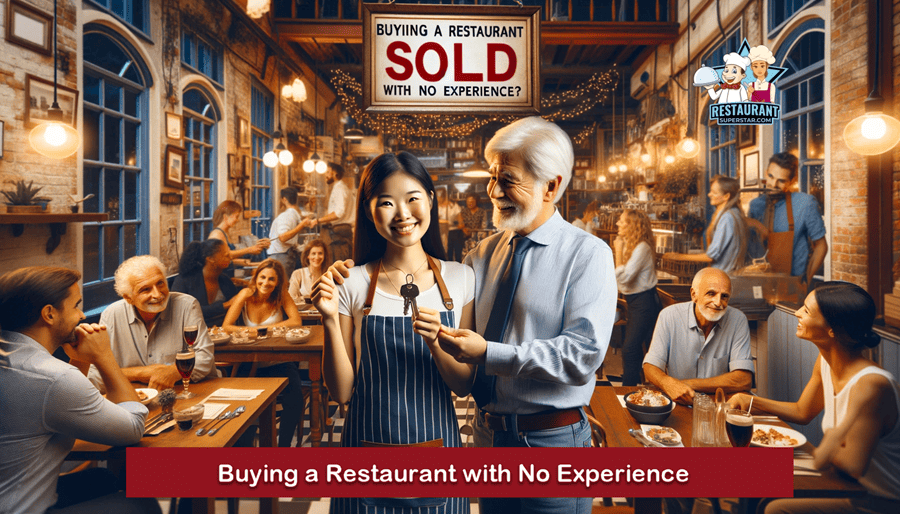How to Sell a Restaurant Without a Broker

You are in the right place if you’re wondering how to sell a restaurant without a broker. This article will cover this question and many other vital questions.
How to Sell a Restaurant Without a Broker?
How to Sell a Restaurant Without a Broker? Selling your restaurant business without a Broker requires a mix of diligence, preparation, and leveraging your network. It requires understanding your restaurant’s valuation, consulting legal and financial experts, preparing your establishment for sale, and reaching out to potential buyers with confidentiality. With the right strategies and persistence, you can sell your restaurant business independently, saving on broker fees.
Hey there,
Jeff here, a restaurant consultant hailing from the sunny shores of Florida. Over my years in the business, I’ve had countless clients and friends come up with that burning question, “Jeff, how do I go about selling my restaurant without getting a broker involved?” And while I’ve always acknowledged the challenges, I’ve also seen many succeed.
Let’s dive into my take on this.
My Take
Owning a restaurant in the vibrant food scene of Florida has its highs and lows. Whether it’s the seasonal crowd rush or the hurricanes knocking at our doors, the restaurant business is ever-evolving.
And sometimes, for various reasons, selling becomes the most viable option. But the fees a broker charges?
Yikes!
They can often be a bitter pill to swallow.
Thus, selling on your own can be a tempting route.
Understanding When It’s Right to Go Broker-Free
I’ve had many late-night discussions with restaurateur pals over some good ol’ Florida orange juice.
The idea of saving those hefty broker fees sounds appealing, but, as with all things, timing is everything.
When is the right moment to venture out solo?
Let’s break it down:
Scenarios Where Selling Without a Broker Makes Sense:
- In-House Interest: You’ve got an enthusiastic manager or a trusted employee who’s shown interest in taking over the reins. These situations are golden. No one knows your business like someone who’s been part of its journey.
- Local Networking: Over the years, being a part of Florida’s bustling restaurant scene, I’ve learned that our community is tight-knit. Someone in your network might be eyeing expansion if you’ve built good relationships with fellow restaurateurs. A casual conversation can sometimes lead to severe talks about selling.
- Financial Readiness: If you’re in a solid financial position where you’re not pressured to sell quickly, taking the independent route allows you more time to find the right buyer and the best deal.
- Well-prepared Sale Package: You’ve got your paperwork in order, a realistic valuation in hand, and a clear, compelling business proposition. If you’re organized and can present your restaurant in the best light, selling on your own might be your route.
Challenges of independently selling a restaurant business
- Time-Consuming: Going broker-free often means a longer selling process. Brokers have lists of potential buyers while you’ll be starting your hunt from scratch.
- Legal Complexities: I can’t stress this enough – there are legalities to navigate. From property agreements to employee contracts, it’s a minefield. And one mistake can cost you dearly.
- Negotiation Skills: Negotiating a fair deal can be challenging. While we all think we’re good negotiators, brokers do this daily. They’ve honed their skills to perfection. You’ll be in the big leagues, going toe-to-toe with experienced buyers.
- Confidentiality Issues: Maintaining confidentiality is critical when selling. The last thing you want is for staff or competitors to catch wind before you’re ready. Without a broker, managing this aspect can be a challenge.
I’ve seen successes and some not-so-great outcomes when restaurant owners decide to sell without a broker.
But if you’re well-prepared and aware of the challenges, you’re already several steps ahead.
Remember, this is your journey. Own it, and make the best decision for you and your restaurant’s legacy.
Importance of a Restaurant Business Valuation

I’ve been around the Florida restaurant scene long enough to witness folks make a classic mistake: diving headfirst into selling without a clear idea of what their place is worth. It’s like diving into the beautiful Gulf waters without checking for jellyfish first – it can be a stingy surprise.
Let’s chat about the crux of selling: the valuation.
What a Restaurant Business Valuation Entails
- Financial Analysis: First and foremost, you will be taking a deep dive into your books. You must remember to analyze profit and loss statements, cash flows, and even those tiny miscellaneous expenses.
- Physical Assets: That excellent brick oven you imported from Italy or the state-of-the-art bar setup you’re so proud of? All of it contributes to the valuation. Remember to consider the equipment, furniture, and even the décor.
- Intangibles: Ah, the hard-to-quantify stuff. Your restaurant’s brand reputation, customer loyalty, location, and online reviews play a part. It’s not just about the cash; it’s about the love and the ambiance you’ve built over the years.
Highlighting the need to get a professional valuation
- Objective Eye: No matter how much we love our businesses, we wear rose-tinted glasses sometimes. A professional comes in without emotional attachment, providing a grounded and unbiased valuation.
- Specialized Know-How: A professional is aware of industry-specific nuances and benchmarks. It’s different from valuing, let’s say, a beachside surf shop.
- Future Earnings Potential: Pros often look at projected earnings, market trends, and potential growth areas – something we might overlook when engrossed in day-to-day operations.
Benefits of Recognizing the Gap Between Expected and Market Prices
- Realistic Expectations: Knowing the actual market value prevents you from overpricing, which can deter potential buyers, or underpricing and leaving money on the table.
- Negotiation Power: With a solid valuation, you’re in a stronger position to negotiate. It’s like going to a Florida fish market with the day’s catch; you set the tone!
- Confidence Boost: When you’re well-informed, it just oozes confidence. Buyers can sense this, and it makes the whole selling process smoother.
Allow me to impart a valuable nugget of wisdom from my sunny corner: exercise patience and take your time in valuation. It sets the stage for everything that follows.
And hey,
You know where to find me if you’re ever in the area and want to chat about restaurant biz over a cold drink.
Consulting Legal and Financial Experts

I’ve seen my fair share of deals go south, not in the good Sunshine State way. I once watched a buddy of mine lose out big time simply because he skimped on consulting the pros.
Selling your restaurant without a broker is challenging, but you can do it with others.
There’s a saying: “You don’t have to swim with the sharks, but it sure helps to know a few.” Let’s dive into why legal and financial experts are your allies.
The crucial roles of attorneys and CPAs in the selling process:
- Dotting the I’s and Crossing the T’s: A sea of paperwork is involved when selling your restaurant. An attorney ensures contracts are watertight and fair, while a CPA ensures your financials are accurate and optimized.
- Risk Mitigation: Legal complications, like those afternoon Florida rain showers, can emerge from the blue. An attorney on board protects you; a CPA can guide you through financial pitfalls.
- Industry-specific Guidance: Not all deals are created equal. Lawyers and CPAs with a history in the restaurant industry can offer specialized insights that generic professionals might need to pay attention to.
Understanding the tax implications and legal formalities:
- Capital Gains and Tax Deductions: Without getting too wonky, selling a business can have significant tax implications. A CPA can guide you through capital gains, possible deductions, and strategies to optimize your tax situation.
- Licensing and Transfer of Rights: Your restaurant might have liquor licenses, health certifications, or even unique permits for that special rooftop bar vibe. An attorney helps navigate these transfers and ensures all legal formalities are met.
The need to maintain deal momentum:
- Efficiency is Key: Have you ever waited too long for a bite on a fishing line? Deal momentum is much the same. The longer the sale drags out, the colder the leads get. Professionals ensure the process is streamlined and timely.
- Building Trust with Buyers: When buyers see you have a competent team behind you, it builds trust. They’re more likely to proceed swiftly, knowing that everything’s above board and professionally managed.
Here’s my two cents: If you’re navigating the waters of selling a restaurant without a broker, then attorneys and CPAs are your trusty navigators.
They might not be the captains, but they know how to steer the ship through rough seas.
And trust me, in the world of selling, you’re bound to face a few storms. Stay prepared, and always have a good crew behind you.
Preparing Your Restaurant for Sale

I feel warm every time I walk into a well-organized restaurant in Florida. The gentle hum of the ceiling fans, the sunlight casting a golden hue over freshly prepped tables, and that unmistakable scent of an eatery ready for daily hustle.
Just like you’d prepare your restaurant for a busy day, there’s work to do when gearing up for a sale. I’ve always said, “You wouldn’t serve a dish without the right presentation, so don’t serve up your business any different.”
Let’s walk through some steps to put your best foot forward.
Organizing Financial Statements and Essential Documents
- Clean Books Equal Keen Looks: Keep those financial statements spotless. It’s like that fresh-pressed white shirt you wear for special occasions. Buyers are more inclined to trust (and invest in) a restaurant with transparent, organized finances.
- Documentation, Documentation, Documentation: Just like you’d have a recipe for your signature dish, maintain a thorough ‘recipe’ for your business. Have employee contracts, vendor agreements, and lease documents ready and accessible. And remember, keeping these documents updated can make a world of difference.
The Importance of Presenting a Strong, Trustworthy Front to Potential Buyers:
- First Impressions Count: Spruce up the physical space. A fresh coat of paint, repaired fixtures, or even new decor can set a positive tone for viewings. You know how we Floridians love our sun-soaked patios; ensure yours invites potential buyers to envision their success there.
- Engage and Inform: Be ready to walk potential buyers through your restaurant’s story. Talk about its highs, its challenges, and most importantly, its potential. Nothing speaks louder than passion, especially in the food industry.
- Online Footprint: Your digital presence matters! Update your website, manage online reviews, and showcase the best of your brand online. In today’s digital age, many buyers will “visit” you online before entering your door.
Consider preparing your restaurant for sale, like setting up for the year’s biggest event. It’s a blend of tidying up the books and the barstools combined with portraying a vision of what the restaurant can be.
And hey,
While you’re at it, why not whip up your signature dish for those potential buyers? Because nothing says “successful restaurant” quite like happy taste buds.
Maintaining Confidentiality with a Non-Disclosure Agreement

The practice of maintaining confidentiality is crucial. Having spent a substantial part of my life in the sunny state of Florida, where information spreads rapidly like a summer rainstorm, I cannot emphasize enough the significance of discretion in selling your restaurant.
Imagine spilling your grandma’s secret essential lime pie recipe to anyone who asks; it’s not the best idea, right?
Selling your restaurant has similar stakes.
Let’s dive into the depths of confidentiality and understand its significance.
Challenges of maintaining confidentiality while selling your restaurant business
- Rumors and Speculations: How quickly a casual mention can spiral into full-blown rumors is incredible. These can unsettle your staff, affect morale, and even alarm your regular patrons.
- Competitive Edge: Word getting out that you’re selling might give your competitors an advantage. They could use this intel to lure away customers or vendors, promising stability.
Introduction to the Non-Disclosure Agreement (NDA)
- The Secret Keeper: Think of an NDA as that trusty vault that protects your restaurant’s most intimate details. It’s a legal contract that binds potential buyers (or anyone you share sensitive information with) to secrecy.
- Peace of Mind: The beauty of an NDA is that it gives you the freedom to discuss your restaurant’s intricacies without the fear of unwanted leaks. Imagine sharing the magic behind your best-selling tropical cocktail without worrying about it popping up on another menu across the street.
Steps to ensure your restaurant business’s sale remains discreet:
- Selective Sharing: Be picky about who you disclose sale information to. Start with those you trust implicitly and expand cautiously.
- Unified Front: Ensure that your managerial team is aligned. Having a consistent message helps in keeping rumors at bay.
- Professional Touch: Engage legal professionals when drafting your NDA. They’ll ensure all those tricky corners are covered, keeping your restaurant’s secrets safe as the treasure of the Floridian coast.
Maintaining confidentiality is like perfecting a dish—attention to detail, the right ingredients (in this case, steps), and a touch of finesse make all the difference.
An NDA is your insurance, ensuring that the intricate details of your restaurant remain protected. After all, as we say here in Florida, it’s better to be safe under the umbrella than drenched in the storm.
Creating a Comprehensive Confidential Information Memorandum

Let’s chat about crafting a stellar Confidential Information Memorandum (CIM). The CIM is the grand menu of your restaurant business, showcasing all the juicy details that make your venture a tempting pick for potential buyers.
Over a cup of Florida’s finest orange juice, let’s delve into the intricacies of a CIM and why it’s your best friend in the selling process.
Introduction to the Confidential Information Memorandum (CIM)
- The Detailed Blueprint: The CIM is your restaurant’s storybook, containing every nook and cranny of your business. From operations to financials, it spills the beans in a good way.
- A Seller’s Showcase: It’s your platform to flaunt your restaurant’s unique selling points, highlighting why it’s a catch for the discerning buyer.
Highlighting its Role in the Sales Process
- Informative Core: The CIM provides potential buyers with comprehensive insight, acting as the sales process’s informational backbone, allowing buyers to make well-informed decisions.
- Attraction Magnet: When well-crafted, it becomes an invaluable asset, drawing in prospective buyers with its clear, detailed portrayal of your restaurant’s worth and potential.
Tips on What to Include Specific to the Restaurant Industry:
- Financial Flavor: Include detailed financial statements, profit and loss accounts, and cash flow statements. It’s like laying out your restaurant’s nutritional facts—transparency is vital.
- Operational Insights: Detail the day-to-day running, staff roles, supplier relationships, and inventory management. Think of this as the kitchen tour—show them how the magic happens.
- Marketing Mix: Illuminate your promotional strategies, customer demographics, and market positioning. The spice blend gives your restaurant its distinct taste in the competitive landscape.
- Asset Appetizer: Provide a list of all tangible and intangible assets in the sale. This gives potential buyers a taste of the concrete and abstract value they’ll be acquiring.
- Legal Layering: Integrate all relevant legal information, including contracts, leases, and licenses, giving a clear picture of the legal standing and obligations of your restaurant.
Crafting a meticulous CIM is akin to perfecting a recipe. Every ingredient, or in this case, piece of information, must be measured and mixed with precision, presenting your restaurant in the most flavorful light possible.
Reaching Out to Potential Buyers

Let’s talk about one of the most exciting parts of the selling process: reaching out to potential buyers. It’s like going fishing in the Gulf of Mexico, you know?
You’ve got your bait (your beautifully prepared restaurant), and now it’s time to cast your line and see who’s interested.
Strategies for Identifying Potential Buyers for Your Restaurant Business
- Profile Your Ideal Buyer: Just like you might imagine your perfect dinner guest, think about the best fit for your restaurant. Are they seasoned restaurateurs, or perhaps someone fresh on the scene? Identifying this can help tailor your approach.
- Attend Industry Events: This is my favorite, hands down. Mingling at industry expos or local restaurant association meetings is different. You’d be surprised by the number of folks keen on diving into a new venture!
Utilizing Online Business-for-sale Marketplaces:
- Cruise the Digital Seas: Platforms like BizBuySell or BusinessesForSale are like eBay for businesses. They’re excellent spots to list your restaurant and attract a flurry of potential buyers.
- Optimize Your Listing: Just as you’d plate up a signature dish to perfection, ensure your online listing is irresistible, with high-quality images, compelling descriptions, and all the vital stats.
Emphasizing the Power of Networks and Platforms like Linkedin:
- Work Those Connections: LinkedIn isn’t just for job hunting. The platform is a gold mine for business connections. Seek out potential buyers, join relevant groups, and actively participate in discussions.
- Recommendations and Introductions: Don’t be shy! Ask your connections if they know someone who might be interested. Sometimes, a personal recommendation can do wonders.
- Content is King: Share posts about your restaurant’s journey, successes, and the upcoming sale. A well-curated story can attract attention and pique interest.
I’ve always believed that selling your restaurant is as much an art as running it. So, whether casting a wide net on digital marketplaces or strategically angling with LinkedIn, ensure your pitch is as delectable as the finest dish on your menu.
The Letter of Intent (LOI) Process

If you are curious like me, you might wonder about these sophisticated LOIs’ significance. However, do not worry, my friend. Allow me to be your reliable guide as we navigate this pivotal stage of selling your restaurant.
Let’s do this together.
Explanation of the LOI and Its Importance in the Selling Process
- What’s in a Letter? Fundamentally, an LOI (Letter of Intent) is a written framework that delineates the initial agreement terms between a buyer and seller. Picture it as akin to a “gentleman’s agreement” – while not legally binding, it lays the groundwork for a subsequent formal purchase agreement. This document encapsulates the essence of a preliminary understanding, facilitating the smooth progression towards a more comprehensive contractual arrangement.
- Setting the Stage: The LOI is your first dance with the potential buyer, where you both lay out your initial terms, like the sale price, payment structure, and any contingencies. It’s essential as it sets the tone and expectations for the rest of the sale process.
Emphasizing the Need to Sign the LOI Before the Due Diligence Phase
- Order Matters: Buyers dig deep into your restaurant’s records, operations, and financials during the due diligence phase. You wouldn’t let someone into your kitchen without knowing they’re serious, correct? Similarly, always have the LOI before letting buyers do their deep dive.
- Protecting Your Interests: An LOI often includes confidentiality clauses, ensuring that whatever the potential buyer learns during due diligence stays confidential. It’s like the secret sauce recipe—only a select few get to know.
Tips on How to Negotiate Favorable Terms
- Know Your Worth: Before entering negotiations, clearly understand your restaurant’s value. Remember our chat about business valuation? It comes in handy here.
- Flexibility is Key: Be prepared to adjust specific terms if it means clinching the deal but always keep your non-negotiables in mind.
- Take Your Time: Rushing can lead to unfavorable terms. Consider each clause, discuss it with your legal and financial experts, and ensure the LOI reflects a win-win for both parties.
The LOI isn’t just a piece of paper—it’s the foundation of your selling journey. Craft it with care, patience, and a dash of strategy. Until next time, this is Jeff, reminding you to season every endeavor with passion and precision.
Navigating the Due Diligence Phase

I’m about to embark on a phase that, let’s face it, can be quite challenging: the due diligence phase.
Now, if the very idea of it makes your stomach churn like mine, fear not. I’ve navigated these waters and gathered some insider tips to make the whole process as effortless as your grandma’s lip-smacking marinara sauce.
So, let’s add some flavor and prepare for a delightful journey.
Overview of What the Due Diligence Phase Entails:
- A Deeper Dive: Due diligence is the investigative phase where potential buyers ensure they get what they’re paying for. They’ll be peering into every nook and cranny of your business—like health inspections but for the entire restaurant.
- Fact-Checking Fiesta: The buyer is verifying all the information you’ve provided up to this point. It’s like checking the seasoning in a dish—too much salt and the deal might go sour.
Preparing for the Variety of Documents and Information the Buyer May Request:
- Have Your Docs in a Row: Imagine scrambling to find your grandmother’s secret pasta recipe during a dinner rush. That’s what it’s like to be unprepared for due diligence. Get those financial statements, employee contracts, leases, vendor agreements, and everything else organized.
- Anticipate Their Needs: Before they even ask, make a checklist of potential documents and have them ready. I’ve learned it’s always better to over-prepare. It shows professionalism and can speed up the process.
Importance of Researching the Buyer and Ensuring Their Credibility:
- Turn the Tables: Just as they vet you, do a little sleuthing of your own. You wouldn’t hand over your restaurant keys to just anyone.
- Check Their Track Record: Look into their past deals, if they’ve been involved in restaurant purchases before, and ask for references. Your restaurant is your baby, and you want to ensure it’s in good hands.
- Trust, but Verify: It’s good to have trust, but it’s always smart to corroborate in business. Ensuring their financial credibility is a must. No one wants a deal falling apart at the eleventh hour because they couldn’t secure financing.
Think of due diligence as the ultimate test of transparency and trust between you and the potential buyer.
While it might feel intrusive, it’s a necessary step towards sealing the deal. Keep your chin up, stay organized, and remember to do your homework, too.
Finalizing the Deal and Transitioning

We’ve come a long way in discussing how to sell your restaurant without a broker, and now we’re reaching the exciting home stretch. Let’s dive into the exhilarating stage of Finalizing the Deal and Transitioning.
Steps Involved in Finalizing the Sale Agreement:
- Dotting the I’s and Crossing the T’s: First, you’ll need to hammer out the final terms of the sale. This includes the purchase price, contingencies, the official closing date, etc.
- It’s Not Over ’til the Documents Sing: Next, prepare all final sales documents. Suppose you pass on a trademark or unique recipe. This might include the bill of sale, lease assignments, or intellectual property transfers.
- Funds Transfer: Once everything’s signed, sealed, and almost delivered, ensure you have a secure way to transfer funds. Trust me, you don’t want any hiccups at this stage!
Emphasizing the Importance of Legal Checks and Clarifications:
- Safety First: Just as you would only serve a dish by double-checking its ingredients, ensure all legal aspects of the sale are above board. If in doubt, consult with your legal team. You’ve come this far without a broker, but a lawyer’s expertise can save you from costly pitfalls.
- Clear the Way: Ensure there are no liens or unresolved debts that could complicate the sale. Remember, clarity now saves headaches later.
Transition Phase: Ensuring a Smooth Handover to the New Owner
- Passing the Torch: Consider staying on for a few weeks post-sale to train the new owner. You know the ins and outs of your restaurant, and a smooth transition can preserve its reputation.
- Prep Your Team: Inform your staff about the change in ownership. Change can be challenging, but clear communication can help alleviate any concerns.
- Lasting Legacy: Hand over all necessary operational manuals, recipes, and other vital info the new owner will need. Ensure they’re set up for success, carrying on the legacy you’ve built.
The final step is How to sell your restaurant without a broker. Remember, it’s all about preparation, transparency, and keeping calm under pressure. If ol’ Jeff here could do it, so can you.
Conclusion
Jeff, your trusty Florida restaurant consultant, is wrapping up our epic journey of selling your restaurant without a broker.
Now, if there’s one thing I’ve been hammering on about during our chat, it’s this: it isn’t a walk in the park, but the rewards are worth it.
Trust me on this one.
Navigating the Maze: Selling your restaurant is like hosting a five-course meal for a whole house on a Saturday night. It’s complex, requires impeccable timing, and has countless details to keep track of.
Opting to go broker-free adds another layer of intricacy to this already-challenging task. You’ve managed bustling kitchens and demanding diners, right?
With diligence and a pinch of grit, you’ve got this.
Be Diligent, Be Thorough: Remember that cutting out the middleman – the broker – means you’re in the driver’s seat. It’s exhilarating but also requires you to always be on your A-game.
Check and double-check. Prepare and then prepare some more. It’s the diligent research, the meticulous planning, and the thorough verification that will steer you clear of pitfalls.
The Sweet Taste of Success: Finally, when you strike that deal and hand over the keys to a new owner, take a moment to bask in your achievement, not just for successfully selling, but for doing it on your terms, independently. A special kind of pride comes from navigating this process on your own.
And the rewards?
Beyond the financial gain, there’s the invaluable experience, the confidence, and the stories you’ll have to share – perhaps over a drink or two.
So, as the sun sets here in sunny Florida, I raise my glass to you, the brave souls embarking on this journey.
Whether it’s the sandy beaches, the swaying palms, or perhaps just the years in this industry, I’ve got a hunch. If anyone can pull off selling their restaurant without a broker, it’s you.
Stay sizzling, and see you around, Jeff.
Jeff Smith is a Restaurant Consultant with over 20 years of hospitality experience ranging from server to owner and general manager. He focuses on Restaurant POS technology as well as restaurant marketing. Check out our world-famous restaurant resources page for a comprehensive offering of hand-picked resources and tools to help your business. You can also check out some of our other restaurant business articles.


